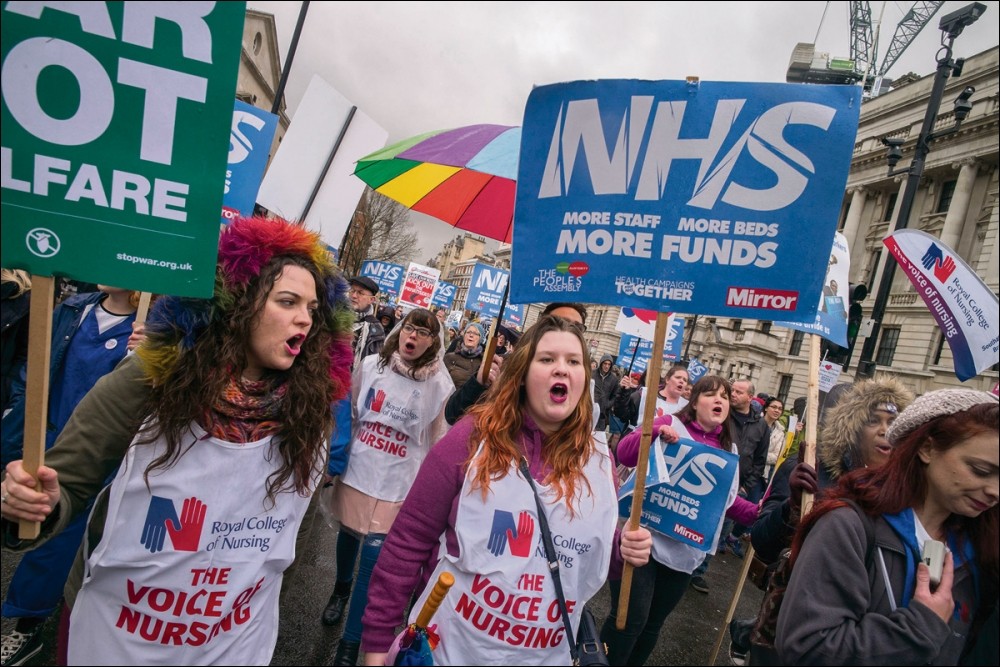Ray Goodspeed spoke to Antonia Berelson, a specialist nurse from East Sussex, after the recent Royal College of Nursing (RCN) Congress. They discussed the pay dispute and the current strike ballot and her thoughts on the future of the NHS and the RCN. [Title photo – Paul Mattsson]
——————–
RG – There was a strike at the end of April – cut short by government legal action. How did that strike go?
So the last strike in Hastings coincided with the May Day Bank Holiday, when all the bikers come down. We would have had more people if it wasn’t for that, but we still had nurses coming out on the picket line who had never been out before, so there was still that strength of feeling. What was really gratifying was that we still had patients coming along, and a retired occupational therapist, and we had the chaplain coming along, who belonged to a different union but he was really positive about wanting to support our fight, what we are facing and our need for a fair pay rise. And the bikers, who had come down from all across the country, as they passed out picket line, were revving their bikes and beeping their horns – they were definitely in support of us!
RG – How did staff respond to the court action – were they intimidated or just more angry?
Absolutely more angry, because the NHS is run on good will of its workers – we would miss a break without thinking, work past our hours, but with the court action that goodwill has 100% run out. There was anger that the government had gone from – you know – “a clap to a slap”. As Pat Cullen said – the government would rather a court room to a negotiation room. It was a cowardly, bad faith action. It did not intimidate nurses – if that’s what they intended – it served the opposite purpose and nurses who had not been so angry certainly were now!
RG – Ok. So some unions accepted the deal and some unions didn’t and the staff side as a whole has generally accepted it. How has that affected relationships between unions and morale in general?
Firstly – I have to emphasise that I do not blame anyone for accepting that pay offer at all. We can see the government’s attempt to divide and conquer, because in a lot of other unions you have people on the lower bands who are absolutely struggling – and we are in a cost-of-living crisis so if you have a one-off pay offer, you’ve all got that credit card bill, you need to fix your broken washing machine, get the kids some extra food – so I don’t blame anyone. It was like this carrot that was dangling.
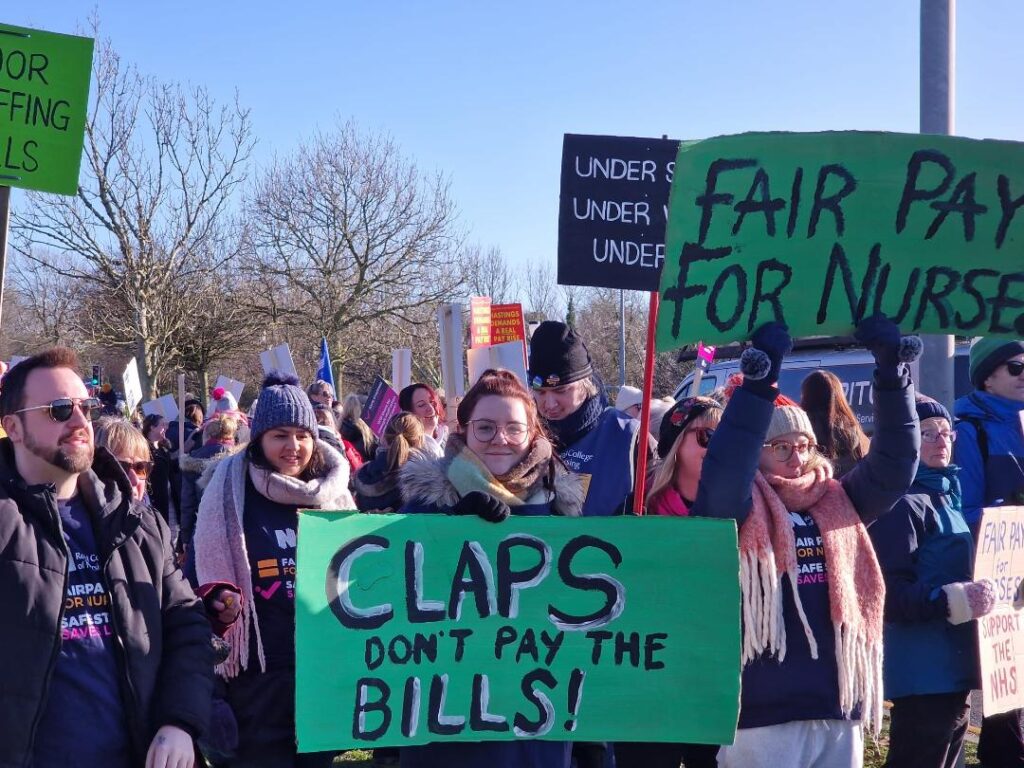
But the thing is, it’s short-term gain for long term pain. I do think this shows that we DO have a need for more political education because talking about “consolidate vs non-consolidated”, or “aggregated vs non-aggregated” – its almost like a foreign language for many of us and it was not clear what the government were offering. But the next part of the offer – the 5% for the next year – is definitely not what we asked for. It’s not going to solve the retention or recruitment problems.
I have often been asked if the RCN is isolated by its stance and I say “No”, because the RCN has the largest number of nurses, who make up the great majority for “Agenda for Change” [The main NHS terms and conditions agreement – ed]. Also, UNITE rejected, as did the Society of Radiographers, and the podiatrists, so we are standing together across the health unions and some people I have spoken to in other unions have supported the RCN – many UNISON members, for example still want to fight with us.
I have been involved with “NHS Workers Say No”, campaigning to reject the offer. That was an astonishing campaign and I feel like the energy and hope that we saw during the Corbyn years has been transferred to the rank-and-file membership of the unions. When we have these zoom meetings it’s like it was on the picket line. We have workers from across the unions – ambulance drivers, learning disability nurses, mental health nurses – people that you would not normally talk to at work – we are not all in the canteen at the same time or around the water-cooler – and we realised that we are many and they are few.
We are all suffering from the same thing, which is lack of money to allow us to have a decent way of life, but also, we can all see our patients suffering. We are all proud of the NHS and want it to flourish but all of us can see the cracks, the disintegration in real time, and seeing the power of us wanting to fight invigorated us. When the RCN members voted to reject, that was the biggest vote they ever had in their history, and although it was a small majority, it was enough to say that those of us who were engaged wanted to carry on and fight.
RG – You went to the recent RCN conference?
I went along as a visitor. I was not a voting delegate but any member with a ticket for RCN Congress is able to speak. The debates were amazing. The one on “corridor care” had everyone in floods of tears. It was heart-breaking to hear what A & E nurses have to put up with – not being able to provide adequate care, and feeling like they are letting their patients down through no fault of their own.
There was an emergency motion on suicide – there has been a huge rise in nurse suicide. One survey of mental health nurses working in emergency care said that 50% of them were having their own mental health difficulties – they are seeing traumatic scenes every day, which is a problem at the best of times, even when you have got the equipment and the staff, but when you feel you are not giving proper care you get additional vicarious trauma.
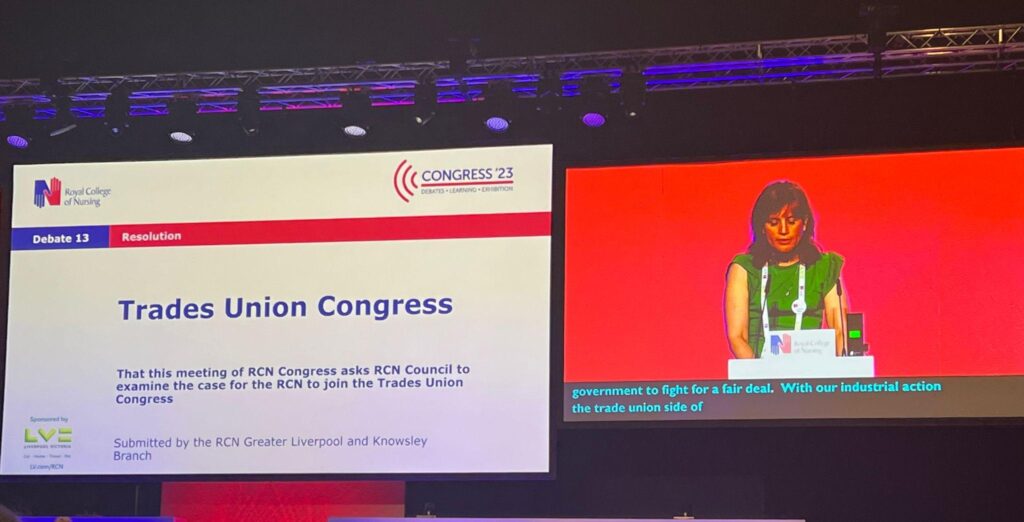
There was a debate about whether the elected Council should start to discuss whether to affiliate to the TUC [Trades Union Congress]. I spoke in that debate in favour of starting that discussion. I said that during this current resurgence of trade unions we should be working across the board, using our strength in numbers, bearing in mind that after leaving the EU we could be losing many of our workers’ rights. We could also rely on the TUC for pooled resources. In the recent Court action, it would have been better to have TUC backing. Regarding the anti-strike legislation coming, Pat Cullen made it clear in her speech to Congress that she was going to be fighting that, but my opinion is that we should always go for strength in numbers. There were strong feelings on both sides. The vote was very, very close, but it failed. That was a disappointment but I feel that a lot of people misunderstood; they thought it was about direct affiliation, whereas the proposal was to just have a conversation.
There was vote on another issue that needs some explanation. When Pat Cullen came back from negotiations, she said the government had promised to “look into” (nothing on paper) a separate nursing pay spine. It was surprising that there were quite a lot of experienced nurses who were against that. Those of us who strongly believe in collegiate trade union working have always been against it as another divide and conquer technique, but it was quite gratifying that a lot of older nurses who remember the pay scales before “Agenda for Change” saying, “Hang on a minute! Coming out of Agenda for Change could mean losing other working conditions such as pensions and annual leave.” It was only a discussion item, rather than a motion to vote on, but it was good to see that nurses were cautious about it. I was pleased because I do not want a promise of “jam tomorrow” to be part of a negotiation, particularly when you have bad-faith actors like the Tory Government. We did vote to leave the so-called “independent pay review body” so that is something positive!

Then Zeba Arif – who is a fantastic nurse and a national treasure for the RCN, spoke out about organising and using member power, going to your local MP and to your representatives. She made a fiery speech and many others made the point that organisation is key. RCN has got a new “organising sector” in the union. This really is member-led and an acknowledgement that things have to change. The RCN is over one hundred years old and it has to become an organisation where grass-root members have a real say and feel part of the process. So it ended on a real high note for me.
RG – So what do you think is going to happen? What is the way forward?
I think that nurses have suddenly found that they have a voice. Caroline Lucas from the Green Party, who was invited to Congress as the local MP in Brighton, gave us a huge thank you, which was fantastic. She said that as nurses we are the original voice for social justice because what we see, day in and day out, are those struggling at the margins. Nurses have always been key in social justice movements. I was looking on Twitter to see if anyone on the Labour Party front bench expressed any thanks or acknowledgement that the RCN Congress was going on, and it’s a shame that they seemed to miss a trick.
As far as the dispute is concerned – the ballot opened on 23rd May and closes on 23rd June, and I am one of those using the “Thru-text” database system to text members to remind them to send their ballots back. Pat Cullen made a real barn-storming speech saying, “I have listened to you all. We are a member led organisation!” The feeling I have is that people are still determined to fight on.
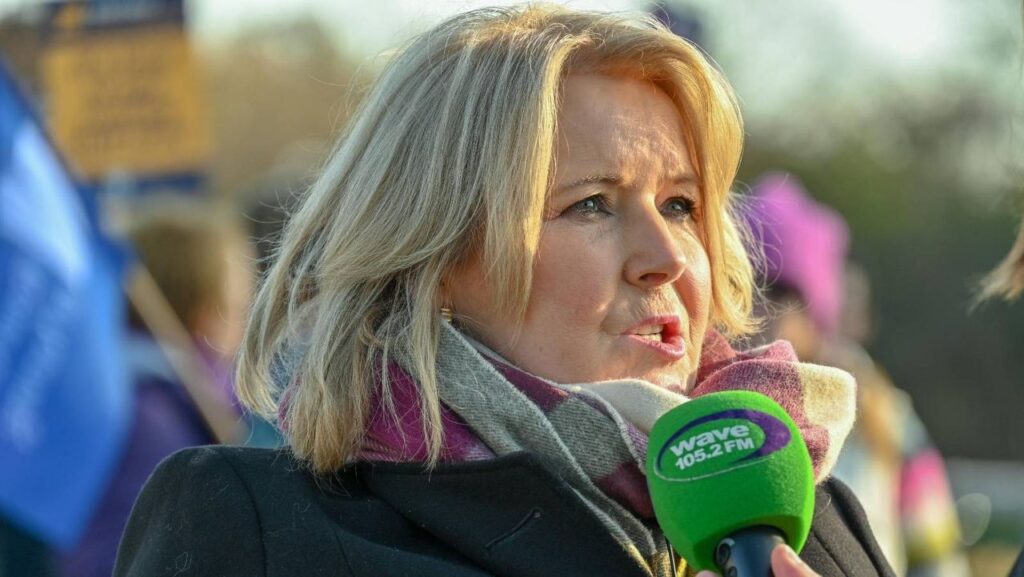
This time, rather than voting trust by trust this mandate will go across all of England so it’s going to be a big decision for people because obviously the existing pay award will be arriving in people’s pay packets in June, but there is all the grass-roots organising that’s going on and the fact that we are still seeing the failure to recruit or retain nurses. Because, how do you get a nurse or thirty years’ experience without keeping those who have been nurses for thirty years? Contrary to what the government says, there is no magic nurses’ tree.
I say to government, “as nurses, we treat our patients with dignity and respect and this is how we are asking to be treated by the government – respect for the safety-critical, university educated professionals that we are.” It is abominable – a stain on the government – that nurses are going to food banks and one in three nurses are skipping meals in order to feed their family.
We have found that we can make an impact, because if it wasn’t for the fact that we took industrial action the first time, we wouldn’t have had the pay offer – albeit far less than we wanted – so industrial action does work!
RG – Do you think that it is possible to win a ballot for all-out strike action?
I am an optimist. It’s not because I am strike hungry, or want to be on a picket line, it’s because I want to protect the profession. And I think that with the fantastic organising that “NHS Workers Say No” have been doing, and by having persuasive conversations with nurses, we can win, even though it is hard when you’ve been working all day and you’re drained and too tired to think about anything else.
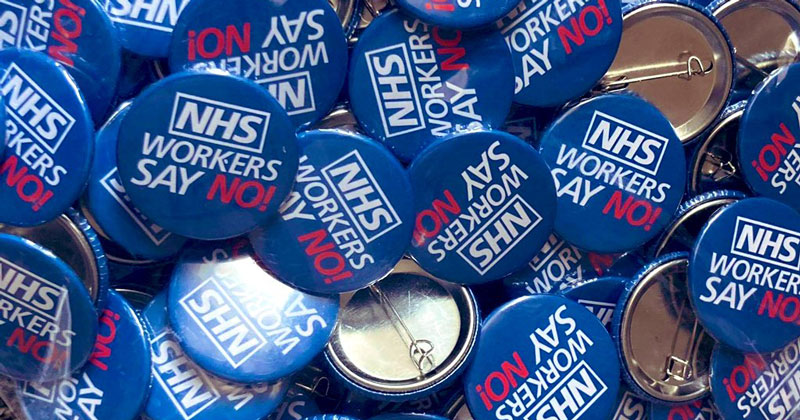
Even if we don’t win the ballot, that doesn’t mean we are going to be giving up. There is still a lot of work to be done. We will still be lobbying the government. Pat Cullen said that she will hold the Labour Party to their commitment to sorting out the anti-strike legislation. And if we do not end up passing the threshold, there will be a general election coming and as nurses, we are voters, too. Our fight is not over.
The lesson to be learnt is that we need more political education and we need to be ensuring cross-union working. This is essential what with the state of the NHS, and looking at Starmer’s plans that have been coming out this week regarding the NHS and potentially using more private providers, and just his lack of understanding about what doctors and nurses actually want, and the lukewarm responses that we have had from the shadow front bench regarding pay restoration.
Whether or not we meet the threshold and get the mandate, the genie can’t go back in the bottle. We have politicised nurses and they have seen that their voice does count and we will continue to see that nursing is political with a small ‘p’ because we are seeing the effects of deprivation on our patients, we are seeing lack of resources. We AREN’T seeing the new hospitals and new doctors and nurses that were promised.
For too long we have just accepted we are a vocation – but we are actually ideally placed to be the warriors fighting for the NHS. It’s coming up to its 75th birthday so we need to fight for the next 75 years.

